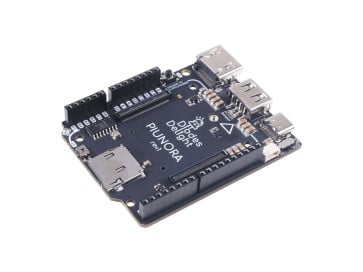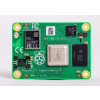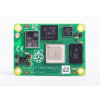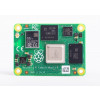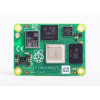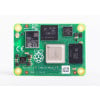Piunora Raspberry Pi CM4 carrier board
Delivery Time: ab Lager
Verfügbarkeit: Sofort-Versand ab Lager
Piunora is a compact, easy-to-use development board for electronics prototyping with Linux. It has a familiar form factor, legible pin labels, and a design that's well suited to space-constrained applications. As a carrier board for the Raspberry Pi Compute Module 4 (CM4), Piunora is essentially a tiny version of the Raspberry Pi 4 Single Board Computer (SBC) with added flexibility to accommodate custom form factors.
In a limited space, the board has been designed to pack with powerful peripherals for rapid prototyping and embedded machine-learning applications. Piunora is open hardware that both the design files and the software will be published by the time of shipment.
It includes an HDMI port, camera-input connectors, and PCI-e support, all of which are not present on a standard Raspberry Pi 4. The M.2 B-Key port on the rear of the board is not only useful for SSD storage, but it can also host a diverse range of PCI-e expansion boards. It's worth noting that, Piunora is open hardware, fully compatible with Raspberry Pi CM4, as long as that software accounts for the hardware peripherals in use. It allows you to utilize the huge collection of existing drivers for the ecosystem and enables you to develop embedded applications using Piunora as easily as possible.
 Piunora is an ideal solution for working with Electronics, where it contains Adafruit and SparkFun developed Qwiic/StEMma-Qt compatible connectors to connect hundreds of high-end sensors quickly and easily through daisy-chain IIC devices via Python. The board includes a Type-C port that can support a power supply and USB 2.0 data transmitting. It consumes less power than the full-featured Raspberry Pi 4 and it can directly be programmed by CircuitPython through a compatibility layer - Adafruit Blinka on Linux SBCs. Additionally, there is an M.2 connector that it provides a perfect interface for a more compact style of add-on board which means it can be utilized to develop a simple, space-efficient, USB-enabled MCU solution.
Piunora is an ideal solution for working with Electronics, where it contains Adafruit and SparkFun developed Qwiic/StEMma-Qt compatible connectors to connect hundreds of high-end sensors quickly and easily through daisy-chain IIC devices via Python. The board includes a Type-C port that can support a power supply and USB 2.0 data transmitting. It consumes less power than the full-featured Raspberry Pi 4 and it can directly be programmed by CircuitPython through a compatibility layer - Adafruit Blinka on Linux SBCs. Additionally, there is an M.2 connector that it provides a perfect interface for a more compact style of add-on board which means it can be utilized to develop a simple, space-efficient, USB-enabled MCU solution.
Features
- Strong compatibility: Fully compatible with software written for Raspberry Pi 4
- PCI-e through M.2 B-Key connector on the rear of the board with dedicated 3.3 V / 3 A supply
- Analog to Digital Converter (MCP3008)
- On-the-fly switching between USB host (USB Type-A) and device mode (USB Type-C)
- Qwiic/Stemma QT connector to easily interface with IIC devices
- A full-sized camera connector that supports all Pi-compatible cameras
- A full-sized HDMI 2.0 port
- A WS2812 Smart RGB LED for user status
- Optional Wi-Fi or eMMC options depending on the choice of CM4
- Two user-controllable buttons: Include software turning each one to a safe-shutdown button
Application
- Develop Projects with Raspberry Pi
- Hacking & Integration
- Embedded Machine-learning Application
- Daisy Chain Topology Application

